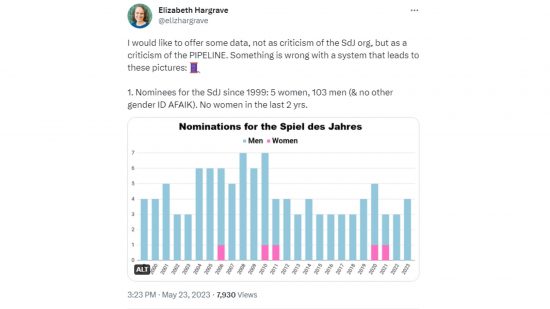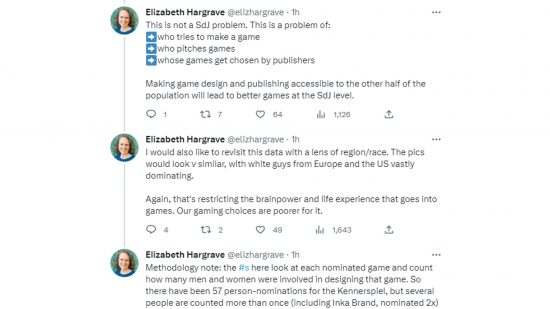No women have been nominated for a Spiel des Jahres award this year. And, according to data from Wingspan board game designer Elizabeth Hargrave, they make up a fractional number of nominees overall. Her graphs, which she posted on Twitter on May 23, show only five women have been nominated since 1999. This is in contrast to the 103 male nominees (and none from other gender identities, it appears). This means women made up less than 5% of nominees.
“I would like to offer some data, not as criticism of the Spiel des Jahres org, but as a criticism of the pipeline”, Hargrave tweets. “Something is wrong with a system that leads to these pictures.” Further tweets from Hargrave show there has never been more than one woman nominated in a year.
The Spiel des Jahres is one of the leading organisations awarding the best board games of the year. The first awards were handed out in 1978, and the 2023 nominations were announced on Monday. Wingspan won Connoisseur-gamer Game of the Year in 2019, making Hargrave herself one of the few female recipients of the award. Other previous winners include Azul, The Quacks of Quedlinburg, Kingdomino, and Codenames.
The gender ratio favours women slightly more when it comes to the Kinderspiel des Jahres, which awards the best kids’ board games. Hargrave notes this award has seen eight female nominees since the award was founded in 2021 (and 43 male). “The only woman who was nominated for any SdJ award this year, out of nine games, was in this category: Sara Zarian for her game Carla Caramel”, Hargrave says.
“This is not a Spiel des Jahres problem”, Hargrave says. “This is a problem of who tries to make a game, who pitches games, and whose games get chosen by publishers.” “Making game design and publishing accessible to the other half of the population will lead to better games at the Spiel des Jahres level”.
Hargrave also mentions we’re likely to see a similar disparity when looking at the race and nationality of designers. “The pics would look very similar”, she says, “with white guys from Europe and the US vastly dominating”. “Again, that’s restricting the brainpower and life experience that goes into games. Our gaming choices are poorer for it.”






